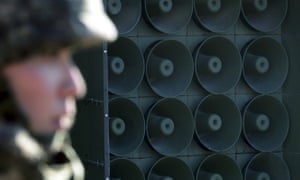South Korea
South Korea silences loudspeakers that blast cross-border propaganda
It wasn’t immediately clear if Pyongyang, which uses loudspeakers to broadcast praise for its leader, Kim Jong-un, and patriotic songs, would reciprocate.
“We hope this decision will lead both Koreas to stop mutual criticism and propaganda against each other and also contribute in creating peace and a new beginning,” the defence ministry said in a statement.
The use of loudspeakers to relay ear-splitting messages that combine criticism of North Korea with praise for life in the democratic, wealthy South, has long been a source of inter-Korean tension.
The decision to press the mute button came as the Wall Street Journal claimed Donald Trump would not be willing to offer North Korea significant sanctions relief before it has substantially dismantled its nuclear weapons programme.
“When the president says that he will not make the mistakes of the past, that means the US will not be making substantial concessions, such as lifting sanctions, until North Korea has substantially dismantled its nuclear programmes,” the newspaper quoted a senior Trump administration official as saying.
Quick guide
What is the Joint Security Area?
Whether or not South Korea’s broadcasts resume could depend on the progress of Kim’s meeting on Friday with the South Korean president, Moon Jae-in, in the first direct talks between the countries’ leaders for more than a decade.
They are expected to discuss replacing the armistice that ended the Korean war in 1953 with a treaty that brings a formal end to hostilities.
The two previous inter-Korea summits, held in 2000 and 2007 in Pyongyang, involved the then North Korean leader Kim Jong-il and South Korean presidents Kim Dae-jung and Roh Moo-hyun.
Friday’s talks, to be held on the southern side of the truce village of Panmunjom, are the precursor to a planned summit between Kim and Donald Trump, although the date and location for their meeting have yet to be decided.
South Korea’s decision to silence its cross-border propaganda machine carries significant symbolic weight, because the broadcasts have come to serve as a bellwether of the state of inter-Korean ties.
Seoul briefly restarted the broadcasts in August 2015 – breaking an 11-year silence – after two of its soldiers were seriously injured by a landmine along the border, but halted them days later. They restarted in January 2016 following North Korea’s fourth nuclear test.
At the end of last year, Seoul used the loudspeakers to relay news of the dramatic defection of a North Korean soldier in an attempt to compound Pyongyang’s embarrassment over the incident.
But in February, North Korea turned down the volume of its own propaganda after the opening ceremony for the Pyeongchang winter Olympics, which featured the country’s athletes and cheerleaders.
For more than two years, North Korean troops ranged along the demilitarised zone – the 4km-wide buffer that has separated the two countries for 65 years – and civilians living nearby have been subjected to a mixture of South Korean music and criticism of the Kim regime.
South Korea’s broadcasts, aired at ear-splitting volume from 11 sites along the border, can be heard over a distance of 24km at night, and about 10km during the day. Their political message, designed to weaken public and military confidence in the regime, occasionally makes way for weather reports, domestic and international news, radio dramas and studio discussions of life the South.
Seoul’s decision comes two days after North Korea said it would end its tests of nuclear weapons and ballistic missiles, and close its nuclear test site.
Trump, who erroneously tweeted on Sunday that North Korea had agreed to denuclearise – it has not said it will scrap its existing weapons – said the world was “a long way” from resolving the North Korean nuclear crisis.
“We are a long way from conclusion on North Korea, maybe things will work out, and maybe they won’t – only time will tell,” he said on Twitter.
copiado https://www.theguardian.com/world

Nenhum comentário:
Postar um comentário